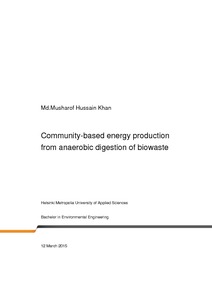Community-based energy production from anaerobic digestion of biowaste
Khan, MD.Musharof (2015)
Lataukset:
Khan, MD.Musharof
Metropolia Ammattikorkeakoulu
2015
All rights reserved
Julkaisun pysyvä osoite on
https://urn.fi/URN:NBN:fi:amk-201504234820
https://urn.fi/URN:NBN:fi:amk-201504234820
Tiivistelmä
Municipal solid waste is one of the greatest problems in the world, which causes not only different types of pollution in the earth but also various types of diseases. There are million tons of waste are produced every year. Hence, this huge amount of waste has to be safely disposed without causing any negative impact on the environment. On the other hand, world's economic and social developments mainly depend on the access of electricity. The conventional way (burning coal) of making electricity causes environmental problems such as GHG emissions and different types of air, water and land pollution. That is why, it is important to find a method by means of which the waste problem could be solved and, as a result, eco-friendly electricity could be gained.
Anaerobic digestion is the process where microorganisms breakdown biodegradable waste into smaller pieces in the absence of oxygen. By this process, it is possible to get electricity from biogas and compost for land. Consequently, anaerobic digestion can reduce pollution caused by organic solid waste and produce environmentally friendly electricity.
This thesis focused on producing energy by treating solid organic waste. The purpose of this thesis was to find a method that would solve both the waste problem and the energy production problem. A model was created for a community where the waste produced would be converted to energy. In order to reach this goal, several aspects such as a participatory waste management, anaerobic digestion system, plant design and sizing and emissions of gases were studied. As there are various types of wastes at the classification boundary, it was impossible to discuss other types of waste excluding organic waste in this thesis.
Anaerobic digestion is the process where microorganisms breakdown biodegradable waste into smaller pieces in the absence of oxygen. By this process, it is possible to get electricity from biogas and compost for land. Consequently, anaerobic digestion can reduce pollution caused by organic solid waste and produce environmentally friendly electricity.
This thesis focused on producing energy by treating solid organic waste. The purpose of this thesis was to find a method that would solve both the waste problem and the energy production problem. A model was created for a community where the waste produced would be converted to energy. In order to reach this goal, several aspects such as a participatory waste management, anaerobic digestion system, plant design and sizing and emissions of gases were studied. As there are various types of wastes at the classification boundary, it was impossible to discuss other types of waste excluding organic waste in this thesis.
